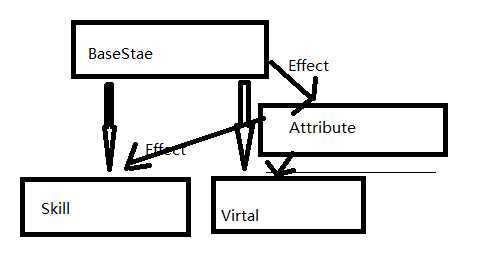标签:des style blog class code java
在游戏开发中,游戏角色占了很大的篇幅,可以说游戏中所有的内容都是由主角所带动。这里就介绍一下角色类的设计和持久化。
游戏中的角色类型不一而足,有不同的技能,有不同的属性等等。有些一个玩家只有一个角色,有些一个玩家可以有多个角色。这里就目前项目来描述一下角色类的构造,思路都是类似的。
早期我写角色类都是直接一个Class,然后想到什么属性就往里面添加,如果游戏过程中需要对属性的修改,逻辑判断也写在这个类中,这样必然导致类的庞大和臃肿,最后你自己也忘记了自己写在什么地方了。
后期的逻辑如果修改了,姑且不论属性之间的互相连带和逻辑连带,你的查找就是一件麻烦事。
这里我们讨论一下一个玩家账号多个角色的构造。
定为一个角色类,包括玩家的疲劳,金币,元宝等等。角色类包括多个英雄对象。
一个英雄类,包括英雄的属性,等级等等,英雄对象包括多个属性对象。
一个属性类,包括属性的值,下一级属性的值等等。
对这些类的修改,类的内部只提供接口,逻辑的判断存在于外部的部件中,而不是自己类的内部实现。这样代码就简洁明了不少,同样逻辑修改也只需要查找对应的部件即可。
当然还有更复杂的,如下图所示:

一个基础属性类衍生出来了Attribute,Virtal,SKill等等。
角色化类创建后,这个类不论游戏的关闭和开启都要和上一次的一样。可以采用持久化的方案。C#中一般采取序列化到本地二进制文件或者XML文件等流序列化。
当然你也可以采用Unity3D的ScriptableObject方案。
http://blog.csdn.net/jjiss318/article/details/7195052
BaseState.CS
基础属性类,可以枚举中动态添加
|
1
2
3
4
5
6
7
8
9
10
11
12
13
14
15
16
17
18
19
20
21
22
23
24
25
26 |
[Serializable]public
class BaseState{ public
int _baseValue; public
int _grown; public
int _max_baseValue; public
Attribute _name; public
BaseState(int
_baseValue, int
_grown, Attribute _name, int
_max_baseValue) { this._baseValue = _baseValue; this._grown = _grown; this._name = _name; this._max_baseValue = _max_baseValue; } //调整接口如下 …………………………}public
enum Attribute{ Might, Constitution} |
BaseCharacter.CS
基础英雄类,可以枚举中动态添加
[Serializable] public class BaseCharacter { public Character _name; public Currency_Kind mycurrency; public int price; public bool _isLocked; public int _level; public int _max_level; public BaseState[] attribute_list; public BaseCharacter ( Character _name,Currency_Kind _kind, int price,int _max_level) { this._name = _name; this.mycurrency = _kind; this.price = price; _isLocked = true; _level=0; this._max_level = _max_level; this.attribute_list= new BaseState[Enum.GetValues(typeof(Attribute)).Length]; AddAllAttriute(this._name,this.attribute_list); } private void AddAllAttriute(Character _name, BaseState[] attribute_list) { AttributeDateBase.GetBaseArrayByName(_name,attribute_list); } } public enum Character { Moking, Super_Pig }
序列化方法,这里就采用本地二进制方法
//持久化英雄数组 public static void Load() { Globals.Character = new BaseCharacter[Enum.GetValues(typeof(Character)).Length]; Debug.Log("load"); //second load if (File.Exists(fileName)) { try { using (FileStream fileStream = new FileStream(fileName, FileMode.Open, FileAccess.Read)) { BinaryFormatter b = new BinaryFormatter(); //这里貌似最好一个个序列化 //BaseCharacter[] gp = (BaseCharacter[])b.Deserialize(fileStream); for (int i = 0; i < Globals.Character.Length; i++) { Globals.Character[i] = (BaseCharacter)b.Deserialize(fileStream); } } } catch (Exception ex) { Utils.WriteLog("Globals.Save occurs an error:" + ex); } } else { HeroDateBase.GetBaseArray(Globals.Character); } } public static void Save() { if (Globals.Character == null && Globals.Character.Length <=0) { return; } try { using (FileStream fs = new FileStream(fileName, FileMode.Create, FileAccess.Write)) { BinaryFormatter b = new BinaryFormatter(); //也要一个个反序列化 for (int i = 0; i < Globals.Character.Length; i++) { b.Serialize(fs, Globals.Character[i]); } Debug.Log("Serialize Save"); } } catch (Exception ex) { Utils.WriteLog("Globals.Save occurs an error:" + ex); } }
搞完了英雄类和属性类的持久化,角色类的持久化也就大同小异了,不过角色也就是玩家一个游戏只有一个,也就不用枚举了。
考虑到英雄类和属性类的字段动态增长,可能每次游戏开辟的内存不同,那么此时反序列化的出来的数据覆盖会不会有错呢?可以考虑一下。
Unity3D 游戏开发构架篇 ——角色类的设计与持久化,布布扣,bubuko.com
标签:des style blog class code java
原文地址:http://www.cnblogs.com/chongxin/p/3716925.html